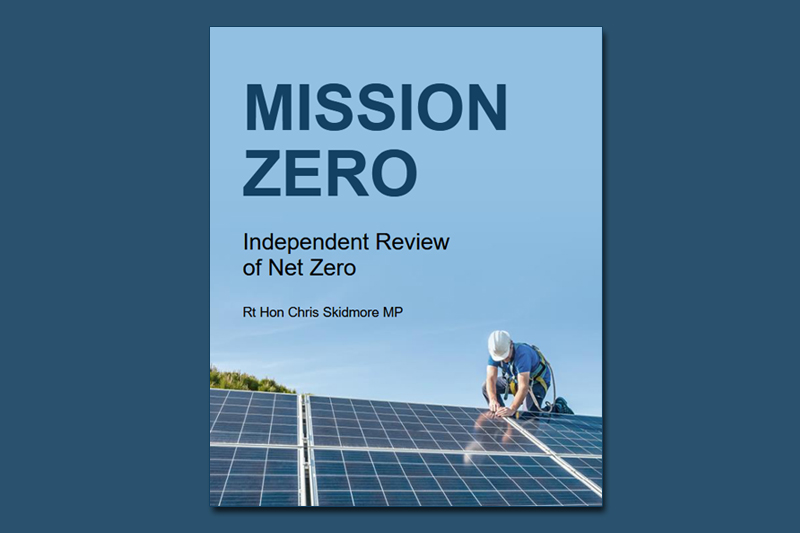
Commissioned by BEIS in September 2022, the ‘Mission Zero’ independent review of Net Zero, published by former Energy Minister Chris Skidmore MP, is said to represent the largest ever engagement exercise on the subject. The 340-page document makes 129 recommendations on how to seize the opportunities from creating a green economy to “deliver Net Zero at scale and lower cost.” Here, PBM presents a number of the industry’s responses:
National Federation of Builders + House Builders Association
We are pleased to see many of the NFB’s recommendations made it into the document. The challenge now is for the Government to implement changes which deliver on, rather than placate, campaigner calls.
Richard Beresford, Chief Executive of the NFB, said: “If the Government decides to read the Skidmore review as a call for more forced net zero policy, their ambition will fail, and we’ll be repeating the mistakes of the last three decades. However, if they read it as a review highlighting regulatory challenges to sustained innovation, investment, and business growth, then Britain can go a long way to not only meeting its climate goals but delivering a much-needed productivity increase.
“Construction and constructors underpin most net zero ambitions because transport, infrastructure, ‘20-minute neighbourhoods’, housing, renewables, and energy are all delivered and maintained by those 2.7 million people working in the sector.
“It was therefore fantastic to see the review home in on the importance of spatial strategies through Local Area Energy Planning (LAEP) and streamlined planning processes because too often, uncertainty and bureaucracy mean projects spend more time and money jumping through hoops – and consequently making some works unviable – than on the project itself. This also impacts the ability to train and retain staff.
“However, the planning recommendations only covered energy, and not the 99% of works holding the construction sector back.”
Rico Wojtulewicz, Head of Housing and Planning for the House Builders Association and NFB, said: “Rather than understanding that the planning process makes greater net zero investment unviable for new development, the review suggests planning should ignore viability to enforce net zero. This is very disappointing, as when it comes to energy infrastructure and LAEP, the review took a more commercially astute view.”
“The same can be said for a call for local authorities to set their own energy efficiency standards, as this contradicts the Government’s ‘Future Homes Standard’ before it is even introduced and fragments industry from moving as one to upskill and invest in net zero.
“It was good to see the review do what the Climate Change Committee (CCC) have been struggling to do in their annual reports and recommend planning reform in Conservation Areas. This is vital as there are around 10,000 conservation zones and 12.5m homes built with traditional construction methods. This means the UK will require considerable workforce investment to ensure our least energy efficiency homes can be made warmer and healthier, but this capacity growth can only come if the planning process permits works to be completed.”
The Government needs to step up and take on board the recommendations of the Net Zero Review carried out by Conservative MP, Chris Skidmore if it is serious about creating a low carbon economy, says the Federation of Master Builders (FMB).
Brian Berry, Chief Executive of the FMB, said: “The building industry is raring to act on energy efficiency improvements, which will decarbonise existing homes and reduce energy consumption, but there has been a lack of direction from the Government now for too long. The FMB welcomes the recommendations made in this report from Chris Skidmore as they show that with the right policy levers being pulled, the building industry can deliver a long term national retrofit strategy, which the FMB has long been championing.
“It’s also positive that the creation of ‘retrofit hubs’ is a key recommendation for moving the industry forward. The FMB and partners have been working on setting up a cross industry retrofit hub to help co-ordinate and upscale retrofit delivery. The report rightly notes that a net zero skills plan will be needed by the Government. There is a serious skills shortage in the building industry with at least a third of FMB members finding it difficult to hire bricklayers and carpenters. We need to see a clear roadmap for skills and a market for retrofit so that local builders can make the transition to training up in new green skills.
“What is abundantly clear from the Skidmore Review are the benefits of retrofitting – it’s a win-win solution. Retrofitting of existing homes lowers bills, warms homes, creates jobs, and provides local builders with skills for the future. The review points out what needs to be done by the Government to make net zero a reality and industry stands ready to deliver on it.”
The FMB has also linked the Net Zero Review to the “concerning dips in housing and repair, maintenance and improvement (RMI) output in November (and the) stagnant overall output for the construction industry, according to this month’s ONS stats, which is a worrying sign not just for the nation’s small, local builders.”
Brian continued: “Private house building, and repair and maintenance work are the backbone of local builders’ businesses, so today’s falls in output signal a worrying winter for the sector. Likely prompted by consumers tightening their belts in the face of cost-of-living pressures, the falls in the ONS data reflect the FMB’s latest State of Trade survey which recorded declining enquiries for the first time in a decade. We know that a lack of viable land, a complicated planning system and a shortage of skilled workers are hitting SME house builders hard.
“In the run-up to the Budget I urge the Government to support local building firms with policies that boost demand and reduce costs. One of the best ways to support the RMI sector is through the introduction of a National Retrofit Strategy to improve the energy efficiency of the nation’s leaky homes, which would create more jobs across the UK and, as set out so clearly in the Net Zero Review by Conservative MP Chris Skidmore, will deliver economic growth.”
The Review makes a strong case for Government to generate certainty and confidence for businesses to invest in decarbonisation. That’s critical for the UK mineral products industry that each year produces 400 million tonnes of essential materials that underpin economic and social development.
MPA responded to the Review’s consultation and also contributed to the Energy Intensive Users Group submission – making key points on issues including Carbon Border Adjustment Mechanisms, CCUS (carbon capture, usage and storage) clusters and dispersed sites, transport and planning – and these have been taken on board in the Review.
Dr Diana Casey, Director of Energy and Climate Change at MPA, said: “The report published today has acknowledged many of the key barriers facing our sector as it transitions to net zero and the actions proposed to start addressing these barriers is welcome.
“It is now up to Government to take up these actions and face head-on the challenges around funding, infrastructure and competitiveness so that UK industry has the certainty, continuity, clarity and consistency required to realise the investment needed. MPA looks forward to working with BEIS, the Treasury and other Government departments on addressing these challenges and delivering the suggested actions.”









